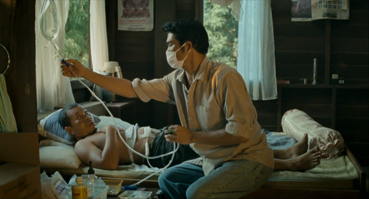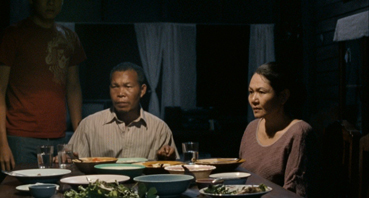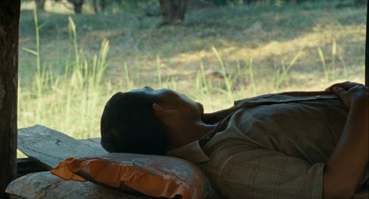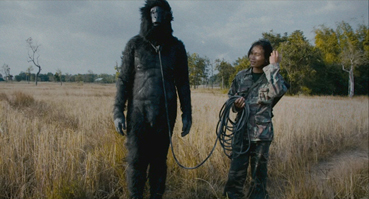| |
"I believe in the transmigration of souls between humans, plants, animals, and ghosts. Uncle Boonmee's story shows the relationship between man and animal and at the same time destroys the line dividing them. When the events are represented through cinema, they become shared memories of the crew, the cast, and the public. A new layer of (simulated) memory is augmented in the audience's experience. In this regard, filmmaking is not unlike creating synthetic past lives. I am interested in exploring the innards of this time machine." |
| |
Director Apichatpong Weerasethakul |
I've got this thing about film titles. I'm sure I've mentioned this at least once before and have even considered writing an article about just that. Two of my favourite categories are those enigmatic ones that reveal next to nothing about the film's content, and those that spell it out in no uncertain terms. Thus a double bill consisting of Soundless Wind Chime and I Married a Monster From Outer Space would have me banging on the cinema door even if I'd not seen the films. I thus nearly squealed with delight when I first read the title of Peter Weiss's celebrated play, The Persecution and Assassination of Jean-Paul Marat as Performed by the Inmates of the Asylum of Charenton Under the Direction of the Marquis de Sade. Hell, I get goose-bumps just typing it.
In theory, at least, Uncle Boonmee Who Can Recall His Past Lives belongs in a third category, one in which the title refers directly to the central character. Famous favourites from this group include The Godfather, The Dark Knight, Leon and Princess Mononoke, but Boonmee differs from them through the addition of a personality trait that may or may not be directly relevant to the film – the fact that our lead character can recall his past lives doesn't mean he's going to, or that this unusual ability will have any bearing on the story. It's the ambiguous and don't-give-a-stuff-about-commercialism nature of this title that made me want to see the film from the moment I first heard about it.

Of course it helps that it was directed by Apichatpong Weerasethakul (who is known affectionately as Joe, a name I have suspect he coined himself to spare non-Thai speakers the embarrassment of being unable to correctly pronounce his full name), whose previous two features, Tropical Malady [Sud pralad] and Syndromes and a Century [Sang sattawat] I was utterly bewitched by. It also won the Palme D'Or at Cannes, a prestigious gong that is regularly (though not always) awarded to films that would never win an Oscar in a million years. Personally I think that's a good sign. Of course, the Weerasethakul factor will likely warn off as a many as it attracts – his films are deeply personal and are clearly not made with any interest in scoring big at the box office. And if you were frustrated or bemused by Syndromes and a Century then it's likely that you'll be giving Uncle Boonmee a wide berth, and nothing I say is likely to persuade you to do otherwise. But if, like me, you were seduced by Weerasethakul's earlier films, then you'll find plenty to enthrall and excite you here.
The Uncle Boonmee of the title is a middle-aged farmer suffering from acute kidney failure. Attending to his medical needs is Laotian male nurse Jaai, and joining him at his country farmhouse to be with him in his final days are his sister-in-law Jen and his younger cousin Tong. One evening, they are in the middle of dinner when the spirit of Boonmee's long-dead wife Huay appears before them. Despite how it sounds, this is no horror movie moment – Huay slowly materialises in an empty chair, and while the assembled group are initially startled, no-one screams or runs from the room, and they are soon all conversing with her like they would with a late-arrived dinner guest.
The strangeness doesn't end there. A short while later, Boonmee's long lost son Boonsong walks in and joins them at the table. Despite the fact that he is covered from head to foot in hair in the manner of a Jack Pearce make-up test for a new Wolf Man movie – the result of having mated with one of the monkey spirits that inhabit the surrounding forest – he is also calmly accepted for what he claims to be. It's the everyday nature of Huay and Boonjong's presence that, for a non-Thai audience at least, moves the drama into the realms of the surreal: Jen asks Boonjong casually why he grew his hair so long; Boonmee digs out photo albums to help Huay catch up on what has happened since her death; and Huay takes over Jaai's medical duties and watches over Jen while she sleeps. It soon becomes clear that both have arrived with a single purpose, to help prepare Boonmee for his transition from this life to the next. To this end, he leads his companions, Huay included, to the remote hilltop cave that was his birthplace in his first life.

And here's where that enigmatic title comes into play. Uncle Boonmee not only subscribes to the Buddhist concept of reincarnation, but can recall specific details of his previous lives, the most unusual of which is recreated cinematically and involves a facially scarred princess, a servant who loves her, and an amorous encounter with a talking catfish. You heard me. Yet like so much in the film, this sequence is tantalisingly ambiguous in nature. Is it really a memory of a past life or just local folklore, a story told by one of the group during the evening it sequentially interrupts?
As with Weerasethakul's two preceding features, the pace is unhurried, the performances very low key, and story takes a back seat to character and a sense of place. Combine this with the fact that Uncle Boonmee was the final piece in a seven part multi-platform installation art project called Primitive and you'd have good reason to expect the film to be even more challenging than its structurally adventurous predecessors. Yet in some ways Uncle Boonmee is Weerasethakul's most approachable feature yet. It has a stronger narrative than its immediate predecessors and does not employ their half-time story/location switch. The tale of the princess and the carp may arrive without warning or explanation, but on its conclusion (if it can be so called) we're returned to the main story as if this brief interruption had never taken place.
Wider issues are touched on but left tantalisingly unexplored, as when Boonmee expresses his belief that his illness is karmic payback for having killed so many Communists in his army days. What the film does vividly create is the sense that death is not an abrupt end to life but a transitional process. From the moment that Huay first appears, it's almost as if the spirit world has leaked into ours and created a crossover zone between life and the hereafter, one that originates in the cave of Boonmee's first birth and reaches out to his homestead like a beckoning hand that he and his companions are compelled to follow. It's thus no surprise that this feeling intensifies as the party approaches its destination, or that Boonmee himself sees the cave as having a womb-like quality, a receptacle of protection from the outside world in which to shelter until the moment of death and rebirth arrive.

Like the first half of Syndromes of a Century, Boonmee adopts the pace of life of its location. There's a serenity to Boonmee's world that proves disarmingly seductive, something quietly but memorably captured when Boonmee and Jen pause on their farmland walk to rest on a sheltered platform constructed this very purpose – as Boonmee lies down and watches the sun-baked woodland beyond, I wanted more than anything to have such a spot in a similar locale, my own personal island of meditative escape from the sights, sounds and pressures of the modern urban existence. In this respect, Boonmee's hope that Jen will run the farm after his death is less a familial transfer of ownership than a parting gift, an opportunity for his city-dwelling relations to experience an alternative, more peaceful and harmonious way of life. The tragedy is that they have become so attached to the trappings of urban existence – symbolised by the television the pair have to be pulled away from and, in an extraordinary final scene, appear to have become hypnotised by – to appreciate and appropriately respond to the gesture.
None of which means that the film will win over those unsympathetic to Weerasethakul's singular approach. The camera style is unobtrusively observational and the pace sedate, and the two lead characters are played by non-professionals, neither of whom are exactly expressive on camera. It's the sort of film that gets labelled pretentious by people who don't understand what the word actually means, and at least one IMDb contributor complained that it is in some way amateurish in its execution. I couldn't disagree more. Unhurried it may be, but Boonmee is a precision-made film whose every shot, pause and gentle exchange has been crafted with purpose – just watch how the shadow falls on Boonmee's body after his death and tell me that wasn't designed to have metaphoric meaning. The result is a true rarity, a film that even someone as non-religious as myself can call, without a hint of irony, a genuinely spiritual work.
Unusually in this digital age, Boonmee was shot on 16mm in an attempt to recapture the look of the film-shot television shows of the director's youth. Though not as crisp as a pristine HD video source, the resulting image is often well detailed and the film grain nowhere near as pronounced as the format can sometimes produce. That richness and pastel-leaning colour palette particular to modern 16mm film stock is evident here, and the transfer itself copes with the night scenes well, the finely balanced contrast retaining the black levels without sacrificing picture detail. The framing is 1.85:1 and the picture is anamorphically enhanced.

You can choose between Dolby stereo 2.0 and Dolby surround 5.1 and I'd go with the 5.1 every time. Dialogue and on-screen action are brighter on the 5.1 and Weerasethakul's evocative use of ambient sound is vividly reproduced here. The difference between the two tracks is sometimes quite striking – watch the scene in which Jaai takes care of Boonmee's kidney drain in stereo and then run it again in 5.1 and it's as if a new ambient track has been added and cotton wool has been removed from the speakers. The use of surrounds is subtle but still quietly inclusive at the right volume, but even the 5.1 is heavily front weighted.
Trailer (1.35)
Not the easiest sell in the world, and although it makes play of the film's supernatural elements, it's still targeted squarely at the art house crowd.
Interview with Apichatpong Weerasethakul (16:05)
The soft-spoken Weerasethakul talks in English about the genesis of the project, the divergence from the book on which the film is based, the autobiographical elements, how the reflection effect in the Princess story was achieved (there's and amusing element to this), and the subtle stylistic changes the film undergoes as it progresses. It doesn't come as a big surprise to discover that he regards Chris Marker as a kindred spirit – what did catch me out was that his decision to become a filmmaker was fired in part by the likes of E.T. and Star Wars.
Deleted Scenes (26:43)
As special feature feature, deleted scenes can sometimes be redundant or be small extensions of existing sequences, but the best ones can provide further insight into characters or narrative, and that's certainly the case here. Chaptered into nine deleted sequences (two of which are made up of two short scenes), the material here is effectively has been edited, sound mixed and scored, and was presumably removed to fine-tune the tone, tempo and ambiguity of the narrative. The scenes certainly clarify elements that are left to speculation in the final cut, particularly the story involving the Princess, and one of them adds a time limit to the journey to the cave (Boonmee tells the others of a vision that convinces him that he has just two days to live), while others expands tellingly on Jen's backstory. There's some gentle humour when Tong offers whisky to Huay ("I bet you can't find this in Heaven") and in his reaction to Boonjong's absence at the second dinner ("Too bad Boonjong isn't here," he laughs, "otherwise we could see a monkey drunk"), and an observation by Boonmee suggesting that this hirsute visitor might not have been Boonjong after all. A drone-accompanied, single-shot drift through the cave of Boonmee's first birth, punctuated by flashing lights and coming to rest on a glowing rock, is every bit as hypnotic as that late film wander through the hospital basement in Syndromes and a Century. For fans of the film, this extra should be essential viewing.
A Letter to Uncle Boonmee (17:47)
A filmmaker attempts to compose a letter to his uncle about his plans for a film based on his life and his ability to recall his past lives, while the camera drifts inquiringly around a house in the village of Nabua that was once forcibly occupied by soldiers, who intermittently appear as if they have been unknowingly transported into the present day. Littered with the slow, hypnotic and evocative tracking shots and the sort of ambient sound that Weerasethakul has down to a tee, this was also created as part of the Primitive project and is fascinating companion to the feature it anticipates.
If you groaned your way through Tropical Malady or Syndromes and a Century then it may well be worth giving Uncle Boonmee a miss – it's very much a work in the same distinctive mold and the stylistic influence of both earlier films can be keenly felt throughout. But if you were entranced by either or believe that cinema should be more than a medium for telling linear stories or a showcase for special effects and the careers of Hollywood stars, Uncle Boonmee is a quietly captivating work from one of modern cinema's most distinctive voices. New Wave's DVD (which is also available on Blu-ray) does the film proud, with a solid transfer and some excellent extras, and thus comes highly recommended.
|